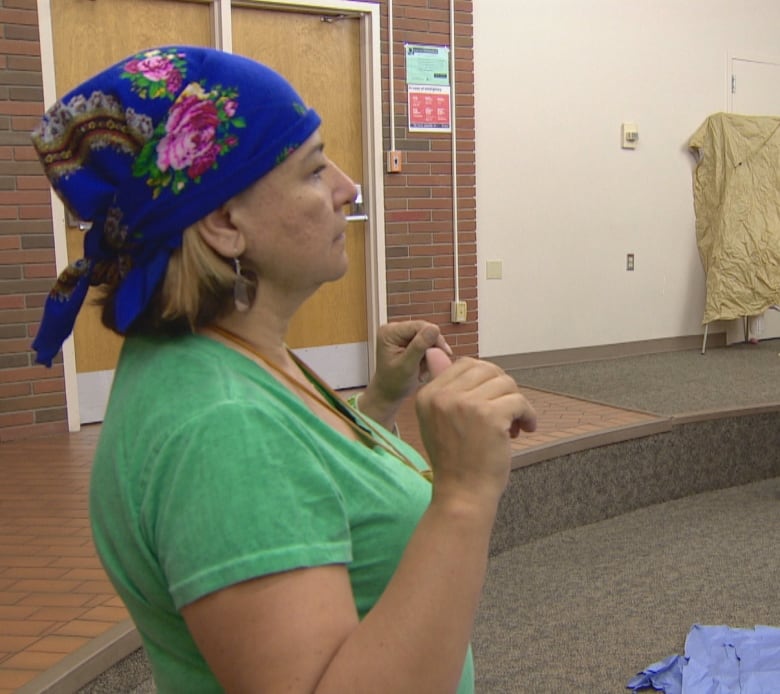Indigenous language class lets instructors find their voices
'Their medicine can be culture and language,' instructor says

Charis Auger plays the role of a Cree person questioning their history and gender identity in a small classroom theatre production at the University of Alberta.
Auger's character is living on 118th Avenue in Edmonton. In the play, the character picks up her cousin and the two urban Cree women drive to meet their grandmother and aunt on reserve. But the trio cannot communicate in the same language, causing heated arguments.
For Auger, 30, it's not far from the truth.
"This is the first time I've been in a safe space where I feel I can express my truth," they said Wednesday. "I wasn't raised speaking Cree, so I've always felt this disconnect with who I am."
- Federal gov't promises millions to Nunavut, N.W.T. for Indigenous language services
- Indigenous languages lost, found and shared
Auger is now reclaiming their language through a literary drama course at the Canadian Indigenous Language and Literacy Development Institute.

This partnership between the University of Alberta's arts, education and native studies departments lets Indigenous instructors perfect their methods of teaching Dene, Cree and Nakota Sioux languages to young First Nations children.
In the teacher's play, the students are working in five different languages, including two dialects of Dene. Drama instructor Darlene Auger sat down with the students and created different scenes of life in Indigenous communities for them to act out.
"The disconnect between elders and the new generation still happens to this day," she said.
Darlene Auger is also teaching her students techniques like mind-mapping and making stories out of objects for the teachers to use with children between kindergarten and Grade 12.
"We hope this gives them the confidence and the strength to go to university," she said. "Their medicine can become culture and their language."
Program recognized by education minister
This week, Education Minister David Eggen presented CILLDI with a $665,000 grant. The money will support the development of online courses and community-based programs while also covering the cost of tuition, accommodations and books for some of the school's students.
"It was a breath of fresh air," Darlene Auger said. "Its about time that our languages are recognized in this country and that we're given the resources to protect them."

The school currently has 100 students enrolled from communities around the Edmonton area, speaking 14 different Indigenous languages.
The university's website said the institute is looking for semi-fluent or fluent speakers of their Indigenous languages to enroll, and students keen in preserving their languages and cultures.
Indigenous languages dying out in Canada
The residential school system, put in place in 1884 under the Indian Act, taught First Nations children how to read and write English instead of their Indigenous languages.
The last residential school closed in 1996.
The Indian Act also banned Indigenous cultural practices in reserves across the country.
Debora Young, a teacher from Maskwacis, a reserve an hour from Edmonton, said programs like CILLDI are an important step in the revitalization of Indigenous culture in the province.
"It's really up to the next generation to keep these languages alive," she said. "Otherwise, our languages will die out."
Dene, a language spoken by only 12,000 people in Canada, was included on UNESCO's list of endangered languages in 2016. Several dialects of Cree, including Plains Cree spoken by groups in Alberta, were also included as part of Canada's 87 endangered Indigenous languages.
In the 2011 census, 13.2 per cent of all Albertans declared they had an Indigenous first language.
Drama lets children address their own issues
Charis Auger channeled their experiences with drugs, being two-spirited, and the first person in their family to attend university into the play.
Drama was the only way they could address their emotions.
"I found ceremony and language, and that is what brought me here [to CILLDI]," they said.
They are hoping young students will embrace their cultures, and Auger is already teaching their 13-year-old son what it means to be an urban Cree.
The best way to make children interested in culture, Young said, is to make language accessible to them.
"When the Hunger Games came out, everyone wanted to go into archery," she said. "If we find the right story, maybe every kid will want to be First Nation."